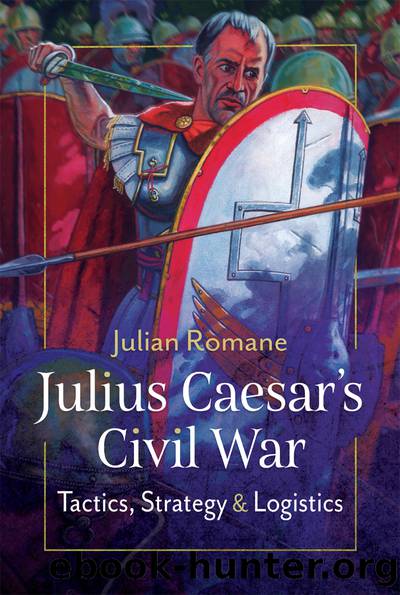Julius Caesar's Civil War by Julian Romane

Author:Julian Romane
Language: eng
Format: epub
Tags: HISTORY / Military / Ancient
Publisher: Pen and Sword
Published: 2023-07-30T00:00:00+00:00
Pharnaces
Once he had marched to Pontus, Caesar gathered his force together. It was not strong, the VI Legion was by now about a thousand swords, battle and hard travel having taken their toll. But these were the hardiest men and best fighters in all of Caesarâs army; they were veterans of many battles, skilled at killing. Caesar also had the two legions which Calvinus had commanded in his expedition to Pontus, XXXVI Legion, and the Pontic legion; their commanders had brought them up to strength, but they were no better than they were under Calvinus. Deiotarusâ cavalry was, however, strong, and skilled. Pharnacesâ representatives soon approached Caesar. They offered peace since King Pharnaces would do all that Caesar might request and handed over a golden victory crown. Further, they went on, King Pharnaces refused to grant Pompeyâs demand for troops, unlike Deiotarus who sent troops to Pompey; yet Caesar had forgiven Deiotarus.
Caesar answered the representatives: he would be more than forgiving of Pharnaces if he carried out Caesarâs instructions. But the king needs to be mindful of the fact that not sending troops to Pompey as a favour to Caesar was over-shadowed by his severe injuries to many Roman citizens in his power. Since it was not in Caesarâs power to bring back the dead or restore mutilated manhood, he did forgive Pharnaces. These are Caesarâs orders: Pharnaces must immediately withdraw from Pontus, release all the slaves which his minions and their families held, and restore property and positions to those injured by his actions. Caesar had the golden victory crown returned to Pharnacesâ representatives, saying, âIf he does these things Caesar demands, then he might send a victory crown and gifts that victorious commanders are pleased to receive from their friends.â
To all Caesarâs demands, Pharnaces readily agreed. Everyone interested in the political world around them knew there were many reasons requiring Caesar to return to Rome. Pharnaces assumed a full assurance of complying with Caesarâs demands would send Caesar off toward Rome and actual fulfilment of the demands was not going to be necessary. Caesar was more than Pharnacesâ equal in chicanery: without forewarning, he marched against his stronghold, Zela.
Near the Galatian border, Zela was surrounded by hills easily fortified. One of these hills, the highest, was the site of a significant Roman defeat during the Mithridatic Wars. Pharnaces rebuilt the fortified camp that had been on the hilltop and occupied it with his field force. Caesar reached the area and set up camp about five miles from Pharnacesâ camp. He scouted out the land around and located a site that had many of the same defensive qualities that protected Pharnacesâ camp. Separated from Pharnacesâ hilltop by a deep ravine, the same steep ascent to grapple with his forces was matched by an ascent to the site Caesar found. The problem with the site was whether Caesar could occupy and fortify it quickly enough before Pharnaces successfully attacked.
Caesar, in his camp five miles away, ordered his men to collect the timbers required by a fortification brought to him.
Download
This site does not store any files on its server. We only index and link to content provided by other sites. Please contact the content providers to delete copyright contents if any and email us, we'll remove relevant links or contents immediately.
The Daily Stoic by Holiday Ryan & Hanselman Stephen(2719)
The Fate of Rome: Climate, Disease, and the End of an Empire (The Princeton History of the Ancient World) by Kyle Harper(2446)
People of the Earth: An Introduction to World Prehistory by Dr. Brian Fagan & Nadia Durrani(2355)
Ancient Worlds by Michael Scott(2115)
Babylon's Ark by Lawrence Anthony(2079)
Foreign Devils on the Silk Road: The Search for the Lost Treasures of Central Asia by Peter Hopkirk(2064)
India's Ancient Past by R.S. Sharma(1994)
MOSES THE EGYPTIAN by Jan Assmann(1982)
The Complete Dead Sea Scrolls in English (7th Edition) (Penguin Classics) by Geza Vermes(1853)
Lost Technologies of Ancient Egypt by Christopher Dunn(1806)
The Daily Stoic by Ryan Holiday & Stephen Hanselman(1794)
The Earth Chronicles Handbook by Zecharia Sitchin(1761)
24 Hours in Ancient Rome by Philip Matyszak(1691)
Alexander the Great by Philip Freeman(1662)
Aztec by Gary Jennings(1560)
The Nine Waves of Creation by Carl Johan Calleman(1527)
Curse Tablets and Binding Spells from the Ancient World by Gager John G.;(1518)
Before Atlantis by Frank Joseph(1490)
Earthmare: The Lost Book of Wars by Cergat(1475)
